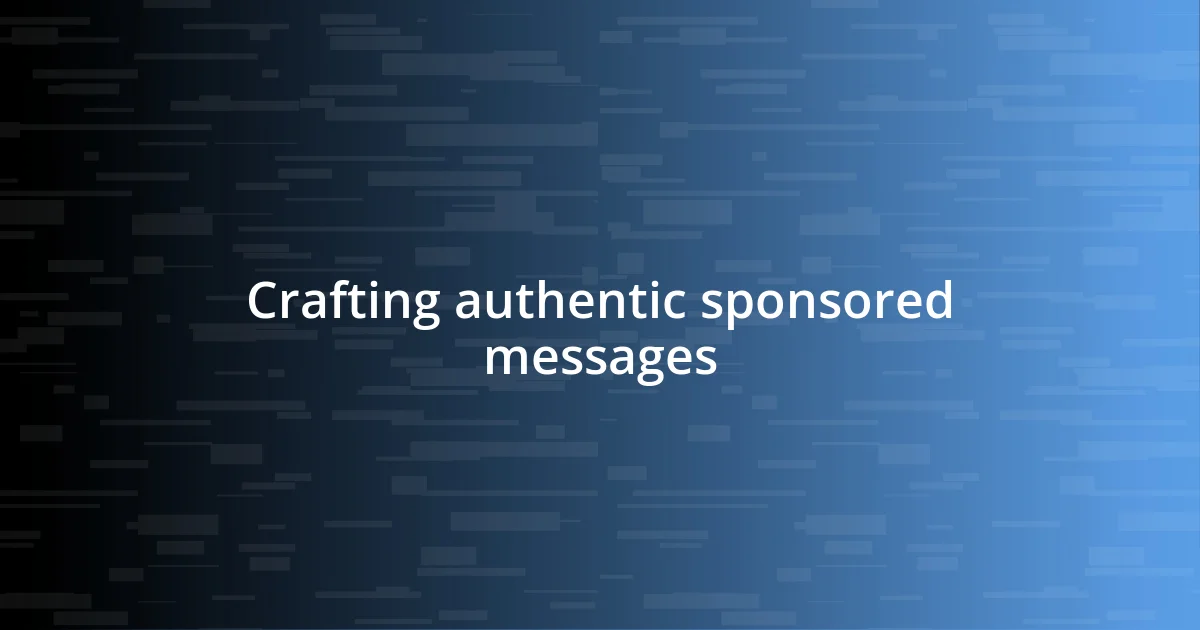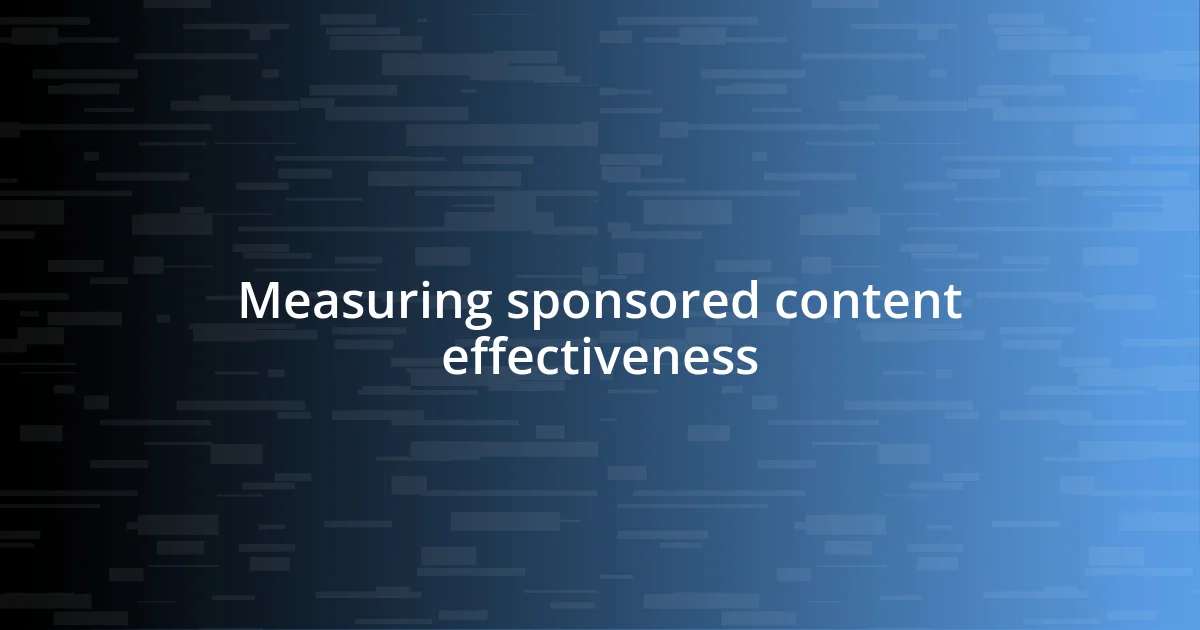Key takeaways:
- Sponsored content effectively engages audiences by blending storytelling with brand promotion, creating connections and building trust.
- Choosing the right sponsors involves aligning values, ensuring audience fit, and maintaining authenticity to foster genuine relationships.
- Future trends in sponsored content include integrating interactive elements, leveraging micro-influencers, and emphasizing sustainability and social responsibility.

Understanding sponsored content
Sponsored content is essentially an advertisement disguised as editorial content, crafted to blend seamlessly with the surrounding articles. I remember the first time I stumbled upon a sponsored piece; I was captivated by its storytelling style, not realizing the brand behind it until the end. Isn’t it fascinating how companies can engage readers in this way, creating a more immersive experience than a traditional ad?
When I analyze the effectiveness of sponsored content, I often think about how consumers are becoming savvier, able to spot overt marketing tactics. Yet, I find it intriguing that well-executed sponsored articles can build genuine interest and trust in a brand. Have you ever felt a connection to a brand after reading about its values through sponsored content? I know I have, which opens up a deeper conversation about authenticity in advertising.
It’s interesting to consider the balance that needs to be struck in sponsored content. On one hand, brands want to promote their products, but they must also provide value to the reader. I recently chatted with a friend who felt misled by a sponsored post that felt more like an ad than an informative piece. This highlights the importance of transparency; if readers feel trusted, the impact can be incredibly positive.

Benefits of sponsored content
Sponsored content offers numerous benefits, particularly in terms of fostering audience engagement. I recall coming across a sponsored article that resonated with my interests—it wasn’t just selling a product, but sharing storytelling and insights relevant to my life. This kind of content can cultivate a bond between the audience and the brand, creating a feeling of loyalty and connection that traditional advertisements often miss.
When I reflect on the power of reach, sponsored content stands out for its potential to tap into wider audiences. I once collaborated on a project where our sponsored piece was featured on a popular website, and the surge in traffic was remarkable. This visibility can significantly enhance brand awareness, especially among target demographics that may not have interacted with the brand otherwise. The seamless integration with quality editorial content makes it a valuable tool for brands aiming to expand their influence.
Another crucial aspect is its ability to drive conversions effectively. From my personal experience, I’ve often found myself purchasing products after reading an engaging sponsored article. The key lies in the content’s ability to provide genuine value and context. Instead of feeling like a sales pitch, it comes across as an important recommendation, sparking that “aha!” moment where the reader instinctively understands why they need the product.
| Benefit | Description |
|---|---|
| Audience Engagement | Creates a deeper connection between the brand and the audience through relatable storytelling. |
| Wider Reach | Increases brand visibility in front of potential customers who may not be familiar with the brand. |
| Driving Conversions | Encourages purchases by presenting products in a context that feels natural and informative. |

Choosing the right sponsors
When choosing the right sponsors, I believe it’s essential to align brand values with your audience’s interests. I once turned down a sponsorship opportunity because the brand’s ethics clashed with what I stand for. It reminded me how important it is to maintain authenticity; my readers come to me for genuine insights, and I want to deliver.
Key factors in selecting sponsors include:
- Brand Values: Ensure their messaging and mission resonate with your own.
- Audience Fit: Evaluate if the sponsor’s products or services appeal to your audience.
- Reputation: Consider the sponsor’s reputation and whether they’ve been involved in any controversies.
- Engagement Potential: Look for sponsors that encourage genuine interaction and feedback, not just sales.
- Content Compatibility: Assess how well the sponsor’s content can be integrated into yours without feeling forced.
Finding the right sponsors can turn your platform into a collaborative space where both parties benefit without losing the trust of your audience. It reminds me of a collaboration I did with a local nonprofit; the synergy with my readers was palpable, leading to meaningful discussions and positive impact—it felt like a win-win!

Crafting authentic sponsored messages
Crafting authentic sponsored messages involves an intricate balance between transparency and value. When I think about my own experiences, I remember a time I partnered with a brand that truly aligned with my passions. I found it easier to create messages that felt genuine, as I was sharing something I genuinely believed in. Have you ever stumbled upon content where the passion felt palpable? That’s the magic of authenticity in sponsored messaging.
It’s also vital to consider the storytelling angle. I vividly recall integrating a product into a personal story about my own journey with sustainability. By weaving the brand into a narrative rather than just listing its features, I engaged my audience emotionally. This approach transformed the message from a mere advertisement to a relatable experience. Don’t you find that messages that tell stories resonate more deeply?
Additionally, transparency can’t be overlooked. I always disclose when content is sponsored, as I believe honesty builds trust with my audience. Once, during a Q&A session, a reader appreciated my openness about sponsorships, saying it made them feel more informed and involved. It’s these small gestures of honesty that can foster long-lasting connections. What about you? How does your audience respond when you’re transparent about sponsored content?

Measuring sponsored content effectiveness
Measuring the effectiveness of sponsored content can sometimes feel like deciphering a complex puzzle. When I look at engagement metrics—like likes, shares, and comments—I notice that they can reveal a lot about how well the content resonates with my audience. I remember a campaign where a simple question in the post sparked an unexpected flood of comments; it was clear that my community was invested in the topic. Have you ever experienced such an engagement that just took off?
Another critical aspect I consider is the conversion rate. I was once surprised by how a single sponsored post led to a significant uptick in sign-ups for a webinar I was promoting. It made me realize that effective content doesn’t just entertain but also motivates action. Tracking these conversions helps me understand the direct impact of sponsorships and refine my strategy over time.
Additionally, qualitative feedback is equally important; it comes straight from my readers. I recently received a heartfelt message from a follower explaining how a sponsored piece had inspired them to try a new healthy lifestyle. That kind of personal connection encourages me to measure success not just by numbers but by the real-life impact it creates. How does your own audience respond, and what do their reactions tell you about the effectiveness of your sponsored content?

Ethical considerations in sponsored content
When it comes to ethical considerations in sponsored content, transparency is paramount. I vividly recall a time when I hesitated to share a sponsored post because I didn’t feel comfortable about the brand behind it. Ultimately, I chose to disclose the sponsorship and share my honest opinions. That was a pivotal moment for me—my audience appreciated my integrity, and it reinforced the importance of open communication. Have you ever felt that push and pull between opportunity and authenticity?
Moreover, audience respect plays a huge role in my approach to sponsored content. I find it essential to provide real value rather than just pushing products. For instance, during a sponsorship with a wellness brand, I focused on creating comprehensive content that offered tips for a healthier lifestyle, rather than simply promoting their items. This approach not only respected my audience but also created a deeper connection. How do you ensure that your sponsored messages serve your audience’s best interests?
Lastly, engaging with the potential consequences of endorsements is critical. I remember reading a piece about a celebrity who faced backlash for endorsing a product that didn’t align with their values. It was eye-opening; it made me reflect on my own partnerships. I now carefully consider how my endorsements might affect my reputation and relationship with my audience. What steps do you take to think critically about the brands you choose to support?

Future trends in sponsored content
As I look ahead, one trend I see gaining momentum is the integration of interactive elements in sponsored content. I remember a time when I stumbled across a sponsored quiz that perfectly matched my interests. Not only did it engage me, but it added a layer of fun that traditional ads often lack. Have you ever found yourself participating in something that felt more like a game than a promotion? This approach not only captivates audiences but also fosters a deeper connection with the brand.
Another significant shift appears to be the rise of micro and nano influencers. I’ve witnessed firsthand how these smaller influencers can deliver authentic engagement that sometimes outshines traditional advertising. Recently, a friend of mine with a modest following shared a sponsored post that felt incredibly relatable. It sparked genuine conversations among her followers, highlighting how intimate connections can often translate into higher trust and conversion rates. Does it make you think about who you follow and why?
Additionally, sustainability and social responsibility will increasingly play a vital role in future sponsored content. I find myself gravitating towards brands that not only promote products but also embody values I care about. For instance, when a brand I admire launched a sustainable line, I felt excited to collaborate with them. The message felt natural, and I was proud to share it with my audience. How much do you think a brand’s commitment to social issues influences your perception of their sponsored content?














